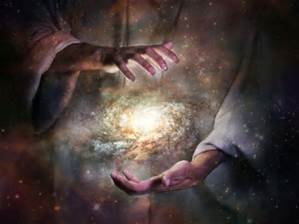Science, Religion, and Truth

Originally posted Jan 1, 2016
My previous post asked the question,
Are you willing to be neither “us” nor “them,” but simply a Truth Seeker, no matter how much it messes with your current worldview?
Today I want to share a passage that carries that same idea of being willing to accept truth whether it “fits” comfortably in the camp you currently identify yourself with - be it secular humanist, atheist, Christian, evolutionist, creationist, light worker, New Ager, Mormon, Jew, Muslim, Hindu, whatever - or not. Can you begin to accept that Truth often encompasses two seemingly contradictory understandings?
The following is written in a highly academic style, so I will insert in brackets my attempt to clarify in plainer English when I feel it’s needed. Bold and emphasis markings are mine.
103: 7.4 The union of the scientific attitude and the religious insight by the mediation of experiential philosophy is part of man’s long Paradise-ascension experience [people work at reconciling science and faith philosophically as part of their souls’ progressive growth towards perfection and the dwelling place of the Trinity Source - God, what some call “spiritual ascension”]. The approximations of mathematics and the certainties of insight will always require the harmonizing function of mind logic on all levels of experience short of the maximum attainment of the Supreme [until we are in “heaven,” we will attempt to use our logic minds and/or our experience to figure this out].
103: 7.5 But logic can never succeed in harmonizing the findings of science and the insights of religion unless both the scientific and the religious aspects of a personality [a person] are truth dominated, sincerely desirous of following the truth wherever it may lead regardless of the conclusions which it may reach.
103: 7.6 Logic is the technique of philosophy, its method of expression. Within the domain of true science, reason is always amenable to genuine logic; within the domain of true religion, faith is always logical from the basis of an inner viewpoint, even though such faith may appear to be quite unfounded from the inlooking viewpoint of the scientific approach [to the beholder of each view, the view appears “logical”].
From outward, looking within, the universe may appear to be material; from within, looking out, the same universe appears to be wholly spiritual. Reason grows out of material awareness, faith out of spiritual awareness, but through the mediation of a philosophy strengthened by revelation, logic may confirm both the inward and the outward view, thereby effecting the stabilization of both science and religion. Thus, through common contact with the logic of philosophy, may both science and religion become increasingly tolerant of each other, less and less skeptical [Truth seekers will philosophically engage both the material awareness and the spiritual awareness].
103: 7.7 What both developing science and religion need is more searching and fearless self-criticism, a greater awareness of incompleteness in evolutionary status [admitting neither understanding is fully formed]. The teachers of both science and religion are often altogether too self-confident and dogmatic. Science and religion can only be self-critical of their facts. The moment departure is made from the stage of facts, reason abdicates or else rapidly degenerates into a consort of false logic.
103: 7.8 The truth —an understanding of cosmic relationships, universe facts, and spiritual values —can best be had through the ministry of the Spirit of Truth [an impartation of Jesus' person, made available to all] and can best be criticized by revelation [insight from celestial sources]. But revelation originates neither a science nor a religion; its function is to co-ordinate both science and religion with the truth of reality. Always, in the absence of revelation or in the failure to accept or grasp it, has mortal man resorted to his futile gesture of metaphysics, that being the only human substitute for the revelation of truth or for the mota of morontia personality [mota refers to the convergence of knowledge/reason and faith/insight, only truly merged when a mortal transitions to the morontia, or the semi-physical/semi-spirit state, after death].
-Urantia, pp 1138-1139
My comments:
This is a challenge to both the camps that try to explain the paranormal as “anything but God” or “anything but aliens.” When the truth is: God and aliens. And to the guarded faith communities who say, “anything but New Age/Earth Energy stuff” and the cynical spiritual communities who say “anything but Christianity/faith in Jesus stuff.” When the truth is: New Age (this has many meanings to many different people, so I would rather say "New Earth")/Earth energy and Jesus. And to those who say “anything but evolution” or “anything but creation.” When the truth is: both evolution and creation.
The list could go on.
When two truths don’t add up…try finding out why. Seek revelation, not the abandonment of facts or attempts to manufacture new ones.
The Truth can be known.
Happy New Year! One year closer to being settled in Light and Love!